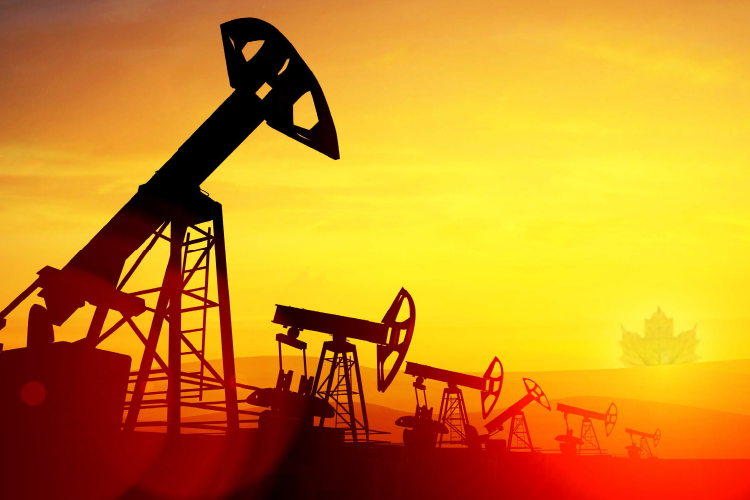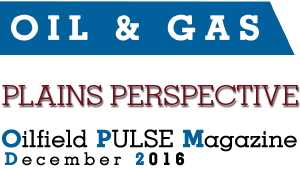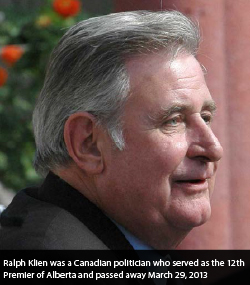
| Date Published | December 23, 2016 |
| Company | Plains Fabrication |
| Article Author | Stephen Mackisoc |
| Article Type | December 2016 Issue |
| Category | Articles, Oil & Gas |
| Tags | Carbon Tax, E&P, Oil & Gas Future, Oil & Gas: Government, S&S |
| HUB SEARCH | PlainsFabrication |


As Premier for 14 years, King Ralph helped start the explosive growth in the oil sands, retired the provincial debt, and wiped out the deficit. He did so WITHOUT RAISING TAXES. Let’s not forget, when he started, Alberta had the highest deficit per capita in Canada. He fought the National Energy Program (NEP), admonished creeps (okay he wasn’t ALWAYS funny) and bums, and had big fiscal wins in the first half of his career. Klein had his own vision and version of economics. Even though interest rates were low, he committed to paying off the provincial debt. There are different schools of thought on this, but the bottom line is, if he said he was going to do it, he did it. Good old cowboy ethics at work!
He certainly had his challenges, but what laid the ground work for him being a four term Premier was his unique ability and willingness to own up to his mistakes. He had no issue working hard to fix his own errors and flaws, and that is a mindset lost on current politicians in Alberta. It’s just too bad that Mr. Klein seemed unable to build long term vision and goals for the province.
That was Klein, but this is more about a tale of two cities or, to be more accurate, a comparison of a state and a province. The recent Fraser Institute report called, “One Energy Boom, Two Approaches”, details the differences and trends between Alberta and Texas. They even borrowed a famous Klein quote, “We do not have a revenue problem; we have a spending problem”! We DO indeed have a spending problem, and one could argue that, except for Klein, we always have. The report highlights where the two oil driven economies have differed over the ten-year period ending in 2014.

King Ralph helped start the explosive growth in the oil sands, retired the provincial debt and wiped out the de cit. He did so without raising taxes.
Texas and Alberta both benefitted from high global prices for their natural resources. People and capital WANTED to come to both places. Taxes were designed to drive growth in the sector. If we look at the numbers now, however, Alberta is in a much worse place than Texas, and it will only worsen as we move forward. Even when considering things like transfer payments, we have still underperformed. Certainly, the Texas economy does not rely on oil and gas to the extent that Alberta’s does. In 2014, shown as a percent of GDP, oil in Texas accounted for 12.3% while oil in Alberta was at a whopping 27.4%! THAT is only an issue if you do not PLAN for the cyclical nature of oil and gas.
Alberta has again failed to consider such long-term planning. At the end of this year, Alberta will be in a net debt position! The report goes on to highlight that in the space of TEN years (2009- 2019) Alberta will move from a net asset position of + $30 billion to NEGATIVE $30 billion. Those should be scary numbers for all of us. Do any famous Alberta bumper stickers come to mind?
Let’s get back to the whole concept of a revenue problem versus spending problem. During the ten-year period of the Fraser Institute report, Alberta’s spending on public programs increased 49% per capita while the increase in Texas was 37.3%. Public sector employment growth in Alberta was more than double that of Texas, 2.6% against 1.2%. We have already been told the Alberta government plans to continue to increase the deficit for many years to come! At what point must the piper be paid? We also need to remember the deficit and the debt do not necessarily reflect 100% of the debt and spending going on either. The true picture is really worse than it appears, because deficit numbers typically reflect only the servicing of the debt being incurred and not the full value.
Much like in the previous boom periods, we chose NOT to continue saving for a rainy day. The current governments, both federal and provincial, are choosing to SPEND MONEY THEY DO NOT HAVE. I believe they could both learn from Klein’s somewhat simpler view of use of funds. When you are making less money, you SPEND LESS MONEY. When you are making MORE, you spend a little more, but you also SAVE MORE as well! We are, unfortunately, well past that stage, so what now?
This is where the Make Canada Great Again connection comes. Texas displayed fiscal prudence and responsibility when spending public funds. We need to adopt more of that kind of thinking. With Trump in power, the coal industry WILL last a few years longer in the USA. Our government NEEDS to understand that dynamic, or we will price ourselves out of the energy market. Solar, wind, and other renewables only exist with large subsidies, and this government will never come clean about the total cost even IF they do come to understand it. Oil and gas creates jobs, drives growth, and contributes to the available funds for public programs and such subsidies. While “two out of three ain’t bad” may have been a great title for a song, it is not so great when it comes to pipeline approvals. We will also have the challenges of getting either line built. If we were going to pick two, they should have been the ones headed toward tidal water and not South.
It sounds like President-elect Trump wants to “pull a Ralph Klein” and change regulations on oil and gas to create jobs and bolster growth. Create an energy climate that ATTRACTS investment rather than scares it away. I am sure he is not
a complete climate denier, and once he has access to all the regular briefings and science, he may see that. In the meantime, I think he will do everything possible to help the coal, oil and gas, steel and other industries recover.
Alberta and Canada had better be prepared to take advantage of this swing in policy and fully comprehend the effect it will have on us. We may be bigger, and we may be on top, but Trump is now in charge of one of the largest economies in the world, and we must plan with that in mind. We must understand and appreciate that, with ten times the number of residents and about nine times the GDP, the USA can determine where we go next. After all, it was Americans who basically started our oil and gas industry (think back to Turner Valley and Leduc), and they still exert massive control over it.
Whatever your political stripe, perhaps we can learn from the new leader of the free world? Or, at least, PLAN to extract whatever benefit we can while minimizing the damage to Canadians.